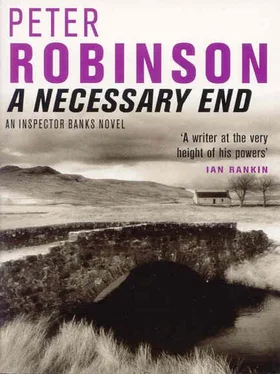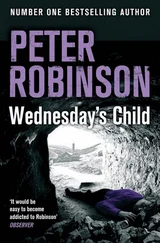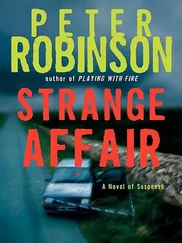Peter Robinson - A Necessary End
Здесь есть возможность читать онлайн «Peter Robinson - A Necessary End» весь текст электронной книги совершенно бесплатно (целиком полную версию без сокращений). В некоторых случаях можно слушать аудио, скачать через торрент в формате fb2 и присутствует краткое содержание. Год выпуска: 1989, ISBN: 1989, Издательство: Avon, Жанр: Полицейский детектив, на английском языке. Описание произведения, (предисловие) а так же отзывы посетителей доступны на портале библиотеки ЛибКат.
- Название:A Necessary End
- Автор:
- Издательство:Avon
- Жанр:
- Год:1989
- ISBN:9780330514729
- Рейтинг книги:5 / 5. Голосов: 1
-
Избранное:Добавить в избранное
- Отзывы:
-
Ваша оценка:
- 100
- 1
- 2
- 3
- 4
- 5
A Necessary End: краткое содержание, описание и аннотация
Предлагаем к чтению аннотацию, описание, краткое содержание или предисловие (зависит от того, что написал сам автор книги «A Necessary End»). Если вы не нашли необходимую информацию о книге — напишите в комментариях, мы постараемся отыскать её.
A Necessary End — читать онлайн бесплатно полную книгу (весь текст) целиком
Ниже представлен текст книги, разбитый по страницам. Система сохранения места последней прочитанной страницы, позволяет с удобством читать онлайн бесплатно книгу «A Necessary End», без необходимости каждый раз заново искать на чём Вы остановились. Поставьте закладку, и сможете в любой момент перейти на страницу, на которой закончили чтение.
Интервал:
Закладка:
On the one hand, what Grant had told him made the possibility of a personal motive for killing Gill much more likely. He didn't know who might have had such a motive yet, but according to what Tim and Abha had said, almost any of the demonstrators — especially the organizers or people close to them — would have known to expect Gill at the demo. And if Gill was there, wasn't it a safe bet that violence would follow?
On the other hand, Banks found himself thinking that if Gill had enemies within the force, perhaps a fellow policeman, not a demonstrator, might have taken the opportunity to get rid of him: someone whose wife or girl-friend Gill had fooled around with, for example; or a partner in crime, if he had been on the take.
Tony Grant hadn't thought so, but he was only a naive rookie, after all. It wasn't an idea Banks would expect Burgess to entertain for a moment; for one thing, it would blow all political considerations off the scene. But another policeman would have expected Gill to cause trouble, could have arranged to be on overtime with him and could have been sure of getting away. None of which could be said for any of the demonstrators. Nobody searched the police; nobody checked their uniforms for Gill's blood.
Maybe it was the kind of far-fetched theory one usually got on the edge of sleep and would seem utterly absurd in the morning light. But Banks couldn't quite rule it out. He'd known men on the Metropolitan force more than capable of murdering fellow officers, and in many cases, the loss would hardly have diminished the quality of the human gene pool. The only way to find out about that angle, though, was to press Tony Grant even further into service. If there was anything in it, the fewer people who knew about Banks's line of investigation, the better. It could be dangerous.
And so, the Sauternes still warm in his veins and a stretch of cold empty bed beside him, Banks fell asleep thinking of the victim, convinced that someone not too far away had had a very good reason for wanting PC Edwin Gill dead.
7
I
Banks turned up the track to Gristhorpe's old farmhouse above Lyndgarth, wondering what the superintendent was doing at home on a Wednesday morning. The message, placed on his desk by Sergeant Rowe, had offered no explanation, just an invitation to visit.
Pulling up in front of the squat, solid house, he stubbed out his cigarette and ejected the Lightning Hopkins cassette he'd been listening to. Breathing in the fresh, cold air, he looked down over Swainsdale and was struck by the way Relton and Maggie's Farm, directly opposite on the south side of the dale, formed almost a mirror image of Lyndgarth and Gristhorpe's house. Like the latter, Maggie's Farm stood higher up the hillside than the village it was close to — so high it was on the verge of the moorland that spread for miles on the heights between dales.
Looking down the slope from the farmhouse, Banks could see the grey-brown ruins of Devraulx Abbey, just west of Lyndgarth. On the valley bottom, Fortford marked the western boundary of the river-meadows. Swainsdale was at its broadest there, where the River Swain meandered through the flats until it veered south-east to Eastvale and finally joined the Ouse outside York.
In summer, the lush green meadows were speckled with golden buttercups. Bluebells, forget-me-nots and wild garlic grew by the riverside under the shade of ash and willow. The Leas, as they were called locally, were a favourite spot for family picnics. Artists set up their easels there, too, and fishermen spent idle afternoons on the riverbank and waded in the shallows at dusk. Now, although the promise of spring showed in the grass and clung like a green haze around the branches of the trees, the meadows seemed a haunted and desolate spot. The snaking river sparkled between the trees, and a brisk wind chased clouds over from the west. Shadows flitted across the steep green slopes with a speed that was almost dizzying to watch.
Gristhorpe answered the door and led Banks into the living-room, where a peat fire burned in the hearth, then disappeared into the kitchen. Banks took off his sheepskin-lined car-coat and rubbed his hands by the flames. Outside the back window, a pile of stones stood by the unfinished dry-stone wall that the superintendent worked on in his spare time. It fenced in nothing and went nowhere, but Banks had enjoyed many hours placing stones there with Gristhorpe in companionable silence. Today, though, it was too cold for such outdoors activity.
Carrying a tray of tea and scones, Gristhorpe returned and sat down in his favourite armchair to pour. After small talk about the wall and the possibility of yet more snow, the superintendent told Banks his news: the enquiry into the demo had been suspended.
"I'm on ice, as our American cousins would put it," he said. "The Assistant Chief Commissioner's been talking to the PCA about getting an outsider to finish the report. Maybe someone from Avon and Somerset division."
"Because we're too biased?"
"Aye, partly. I expected it. They only set me on it in the first place to make it look like we were acting quickly."
"Did you find anything out?"
"It looks like some of our lads overreacted." Banks told him what he'd heard from Jenny and Tim and Abha.
Gristhorpe nodded. "The ACC doesn't like it. If you ask me, I don't think there'll be an official inquiry. It'll be postponed till it's no longer an issue. What he's hoping is that Superintendent Burgess will come up with the killer fast. That'll satisfy everyone, and people will just forget about the rest."
"Where does that leave you?"
"I'm taking a few days' leave, on the ACC's advice. Unless anything else comes up — something unconnected to Gill's death — then that's how I'll stay. He's right, of course. I'd only get in the way. Burgess is in charge of that investigation, and it wouldn't do to have the two of us treading on each other's toes. But don't let the bugger near my office with those foul cigars of his! How are you getting on with him?"
"All right, I suppose. He's got plenty of go, and he's certainly not stupid. Trouble is, he's got a bee in his bonnet about terrorists and lefties in general."
"And you see things differently?"
"Yes." Banks told him about the meeting with Tony Grant and the possibilities it had opened up for him. "And," he added, "you'd think Special Branch would have known if there'd been some kind of terrorist action planned, wouldn't you?"
Gristhorpe digested the information and mulled it over for a few moments, then turned his light-blue eyes on Banks and rubbed his chin. "I'll not deny you might be right," he said, "but for Christ's sake keep your feet on the ground. Don't go off half-cocked on this or you could bring down a lot of trouble on yourself — and on me. I appreciate you want to follow your own nose — you'd be a poor copper if you didn't — and maybe you'd like to show Dirty Dick a thing or two. But be careful. Just because Gill turned out to be a bastard, it doesn't follow that's why he was killed. Burgess could be right."
"I know that. It's just a theory. But thanks for the warning."
Gristhorpe smiled. "Think nothing of it. But keep it under your hat. If Burgess finds out you've been pursuing a private investigation, he'll have your guts for garters. And it won't be just him. The ACC11 have your balls for billiards."
"I don't know as I've got enough body parts to go around," Banks said, grinning.
"And this conversation hasn't taken place. I know nothing about what you're up to, agreed?"
"Agreed."
"But keep me posted. God, how I hate bloody politics."
Banks knew that the superintendent came from a background of Yorkshire radicals — Chartists, the anti-Corn Laws crowd — and there was even a Luddite lurking in the family tree. But Gristhorpe himself was conservative with a small "c." He was, however, concerned with the preservation of human rights that had been fought for and won over the centuries. That was how he saw his job — as a defender of the people, not an attacker. Banks agreed, and that was one reason they got along so well.
Читать дальшеИнтервал:
Закладка:
Похожие книги на «A Necessary End»
Представляем Вашему вниманию похожие книги на «A Necessary End» списком для выбора. Мы отобрали схожую по названию и смыслу литературу в надежде предоставить читателям больше вариантов отыскать новые, интересные, ещё непрочитанные произведения.
Обсуждение, отзывы о книге «A Necessary End» и просто собственные мнения читателей. Оставьте ваши комментарии, напишите, что Вы думаете о произведении, его смысле или главных героях. Укажите что конкретно понравилось, а что нет, и почему Вы так считаете.












